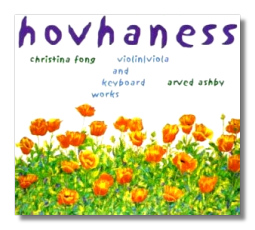
The Internet's Premier Classical Music Source
Related Links
- Hovhaness Reviews
- Latest Reviews
- More Reviews
-
By Composer
-
Collections
DVD & Blu-ray
Books
Concert Reviews
Articles/Interviews
Software
Audio
Search Amazon
Recommended Links
Site News
 CD Review
CD Review
Alan Hovhaness

Chamber Works
- Oror "Lullaby"
- Varak
- Chahagir
- Saris
- Shatakh
- Yeraz "The Dream"
- Khirgiz Suite
- Duet for Violin and Harpsichord
- Three Visions of Saint Mesrob
Christina Fong, violin and viola
Arved Ashby, piano and harpsichord
OgreOgress 634479255021 DDD 58:24
Alan Hovhaness (1911-2000) is most famous for his symphonies, of which he wrote sixty-seven, notably the Second ("Magic Mountain"), recorded by Fritz Reiner and the Chicago Symphony Orchestra, among others. He was prolific in many genres, however. Compared to his orchestral works, his chamber music has been neglected by record companies. This disc contains his complete works for unaccompanied violin and viola, and also his complete published works for those instruments accompanied. Still, as one will note, this disc's total timing is under one hour.
Hovhaness was born in the United States. His father was of Armenian heritage, and a definite Armenian influence can be heard in this repertoire. (This is timely, given the recent upsurge of interest in issues of concern to the Armenian people: an Arshile Gorky retrospective, new writings about the Armenian genocide, Atom Egoyan's film Ararat, etc.) Still, this was not a composer to limit himself within a single tradition, and his music also was influenced by Eastern mysticism, and, to a lesser extent, by the spirit (if not the letter) of John Cage. In the 1960s, he traveled to India, Japan, and Korea where he studied the traditional music of those countries. Above all, Hovhaness wished to touch the average listener, not the self-styled "expert," so his music is tonal, consonant, and – without condescension - within the reach of all.
This CD, which contains several first recordings, arranges the works in chronological order, from Oror (an Op. 1a from 1922/26) to Three Visions of Saint Mesrob (Op. 198 from 1962). One should note that the Hovhaness catalog exceeds 400 works, and that it wasn't until the 1960s – after most of these works were written – that Asian elements became more prominent in his music.
Much of this music is elegiac; some of it is ethereal, and some of it makes one's toes tap, because the composer does interesting things with rhythm and meter. All of it is tonal, and a beautiful and satisfying listening experience is guaranteed throughout. There are no "big" pieces here, in terms of size or ambition, but sushi can be as satisfying as a Porterhouse steak. It is interesting how little the composer's style changed over the forty-year span presented here. Still, as OgreOgress is a label whose pet composers include Cage and Morton Feldman, we are encouraged to listen to the similarities and find differences therein. The alternation of works for violin and viola is effective, and refreshing to the ears. Once the disc is over, you'll find yourself misty with nostalgia for lands you've never even visited.
Fong, the label's star string-player, goes between the two instruments with ease, pouring out throbbingly emotional tone, but letting the music sing for itself. Ashby, who some might know better for his work as a writer, is an excellent, intimate accompanist. They have been recorded in a generously warm environment.
OgreOgress discs can be purchased through their website, ogreogress.home-page.org, and I respectfully suggest that you do so!
Copyright © 2003, Raymond Tuttle




















